
Le programme académique est conçu pour rendre l’équipement hautement performant de TA Instruments accessible aux établissements universitaires. Nous accordons une importance particulière à nos clients universitaires qui développent de nouveaux matériaux et de nouvelles applications et produisent des publications, et plus important encore, des diplômés talentueux qui constitueront de futurs partenaires au sein de notre industrie. Découvrez toutes nos technologies innovantes ci-dessous :
Que voulez-vous savoir sur votre matériau ?
Survolez chaque technique pour voir les propriétés qu’elle mesure :
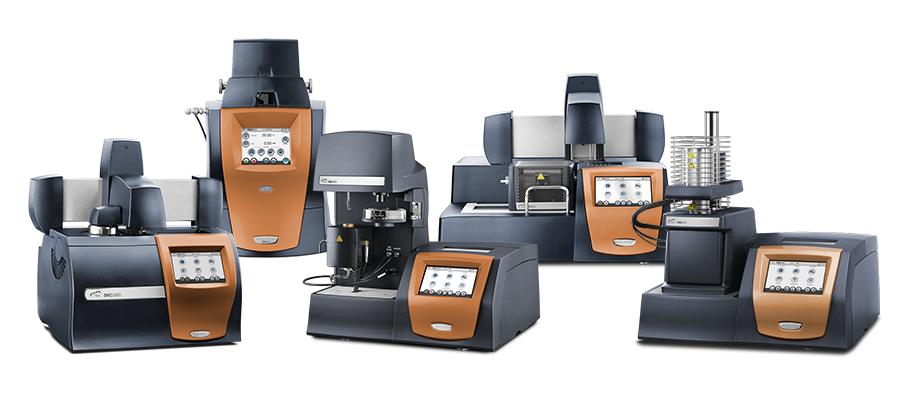
Instruments et applications thermiques
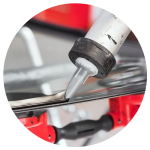


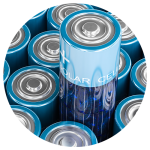

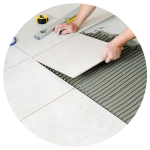





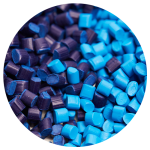
La série Discovery DSC est l’instrument de pointe pour la mesure des températures et des flux de chaleur associés aux transitions thermiques dans un matériau. La technologie de flux de chaleur Tzero™ brevetée de TA Instruments fournit les lignes de base les plus plates et offre la sensibilité et la résolution les plus élevées sans qu’il soit nécessaire d’effectuer de longs calculs ou corrections avant et après l’essai. Ayez confiance dans chaque série de données, quelle que soit la personne qui l’exécute !/div>
- L’écran tactile intégré est intuitif et permet de configurer les procédures de test et d’utiliser l’instrument.
- La technologie Tzero™ mesure directement la capacité thermique et rend les expériences DSC® modulées plus rapides et plus précises pour la séparation la plus efficace d’événements thermiques complexes.
- Les routines d’étalonnage personnalisables offrent la flexibilité nécessaire à de nombreux instruments de recherche.
- La possibilité d’ajouter un passeur d’échantillons, un photocalorimètre, des accessoires de microscopie et bien plus encore fait de la série Discovery DSC le choix idéal pour répondre à l’évolution des besoins des laboratoires.
Transitions vitreuses, point de fusion, cristallisation, changements de phase, capacité thermique, cinétique de polymérisation, temps d’induction à l’oxydation, stabilité à l’oxydation
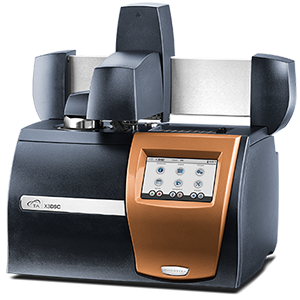
- La balance Tru-Mass™ haut de gamme est isolée thermiquement pour les lignes de base les plus plates et la détection la plus précise des plus petits changements de masse.
- Le contrôle hors norme de l’atmosphère dans l’ATG étanche au vide permet de doser sans décontamination jusqu’à quatre gaz avec une commutation et un mélange contrôlés
- L’écran tactile intégré simplifie l’utilisation et place les fonctions clés au bout de vos doigts.
- Des techniques couplées supplémentaires telles que GC-MS, FTIR et MS pour obtenir des informations maximales sur l’échantillon.
- Les fonctionnalités avancées en option comprennent Hi-Res™ TGA, MTGA™, signal DTA et un passeur d’échantillons automatique à 25 positions.
Température de changement de masse, quantité de changement de masse, température de décomposition, cinétique de décomposition, volatilisation, analyse de la composition des matériaux, stabilité à l’oxydation, résidus
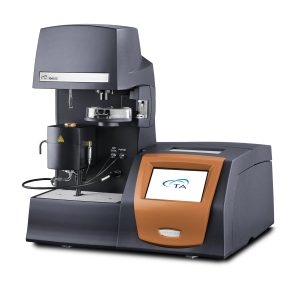
- L’écran tactile intégré est intuitif à naviguer et place les fonctions clés au bout de vos doigts.
- La thermobalance horizontale à double faisceau avec thermocouples intégrés est facile à remplacer et permet de mesurer directement la température de l’échantillon, la température de référence et la température différentielle.
- Le contrôle hors norme de l’atmosphère est étanche au vide et permet d’introduire jusqu’à quatre gaz afin de tester la plus large gamme d’applications possible.
- Les capacités d’essais modulées vous permettent de mesurer directement la capacité thermique en une seule fois et de calculer l’énergie d’activation en temps réel.
Transitions de phase, points de fusion, cristallisation, capacité thermique, température de décomposition, cinétique de décomposition, volatilisation, résidus, stabilité thermique et oxydative
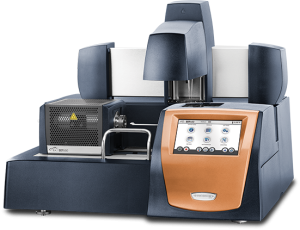
- • L’écran tactile intégré est d’une utilisation intuitive et place les fonctions clés au bout de vos doigts.
- • Notre moteur sans contact et sans frottement vous permet de tester n’importe quel matériau, des caoutchoucs très souples aux composites et plastiques denses ou durs.
- • Une large gamme de montages d’essais vous permet de plier, de fléchir, d’étirer ou de tester la tension de votre matériau afin de trouver les informations dont vous avez besoin.
- • Des modes d’essai avancés étendent les capacités du TMA et fournissent des informations encore plus précieuses sur le comportement mécanique de votre matériau.
Coefficient de dilatation thermique (CTE), dilatation et contraction de l’échantillon, points de ramollissement, températures de transition vitreuse, délaminage
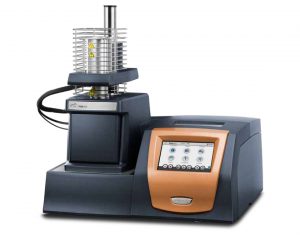
Le Discovery DMA 850 est l’instrument DMA le plus vendu de l’industrie, connu pour ses mesures de force précises et reproductibles sur une large plage de températures. Le DMA 850 peut quantifier les composantes élastiques (semblables à des ressorts) et visqueuses (fluides) de la réponse d’un échantillon, ce qui est essentiel pour une caractérisation fiable et complète des propriétés viscoélastiques.
Caractéristiques de nos DMA :
- Faciles à installer, les pinces à alignement automatique sont disponibles dans un ensemble complet de types de déformation pour s’adapter à une large gamme d’échantillons.
- La fonction de mise à l’échelle automatique élimine les approximations des conditions de démarrage et garantit que la force et le déplacement sont automatiquement maintenus, ce qui permet à tous les utilisateurs d’obtenir des données de qualité à chaque fois.
- DirectStrain™ offre un contrôle de la déformation en temps réel pour des mesures rapides et précises d’applications difficiles, telles que les matériaux à changement rapide ou les échantillons souples à haute fréquence.
- L’écran tactile intégré est d’une utilisation intuitive et place les fonctions clés au bout de vos doigts.
Propriétés mesurées :
Viscoélasticité (module de stockage, module de perte, tan delta), température de transition vitreuse (Tg), superposition temps-température (TTS), transitions secondaires, module, fluage et compliance au fluage, relaxation des contraintes, rétraction et forces de rétraction
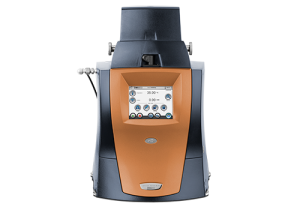
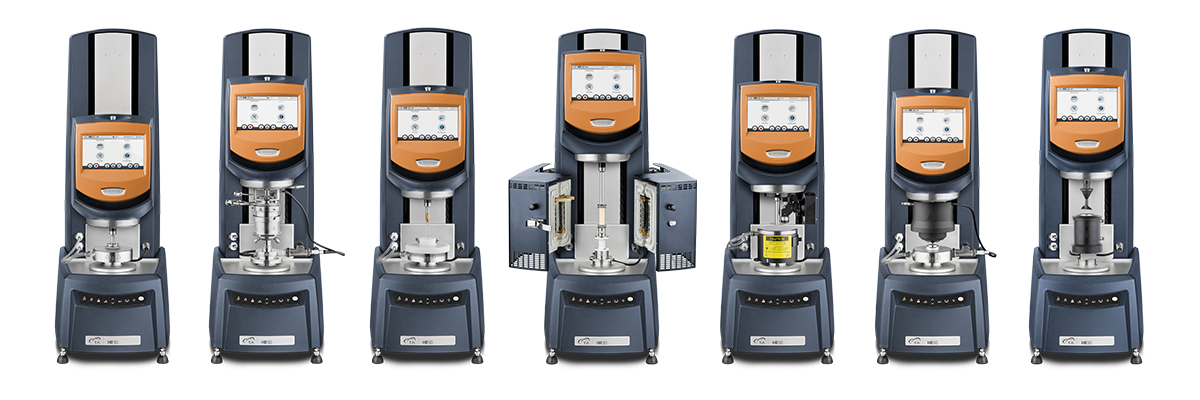
Instruments et applications de rhéologie











Le HR 20 est un rhéomètre polyvalent exceptionnel, capable de répondre à tous les besoins, de la recherche de pointe aux essais rigoureux dans les laboratoires partagés. Une grande variété d’accessoires disponibles vous permet de modifier votre configuration à la volée pour répondre aux exigences de votre recherche, aujourd’hui et à l’avenir.
- Plus de 50 systèmes environnementaux et accessoires SmartSwap™ peuvent être interchangés et auto-calibrés par l’utilisateur en moins de 10 minutes.
- L’interface utilisateur simplifiée et le logiciel sont intuitifs pour les utilisateurs de tous niveaux de compétence afin d’obtenir des informations sur les propriétés des matériaux.
- La précision et l’exactitude de haut niveau dans la collecte des données propulseront votre recherche au niveau supérieur.
Propriétés mesurées :
Viscosité, limite d’élasticité, thixotropie, durcissement, module (G’, G », G*), analyse mécanique dynamique (E’, E », E*), facteur d’amortissement (tan delta), transitions vitreuses, transitions sub-ambiantes, relaxation des contraintes, fluage-récupération
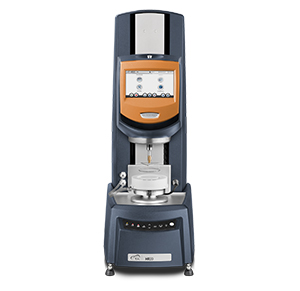
Le HR 30 est un rhéomètre de premier ordre destiné à la recherche pour les scientifiques qui cherchent à repousser les limites de la science des matériaux en exploitant sa sensibilité et sa précision de mesure inégalées. Les progrès de la technologie de base unique du TA vous permettent de mesurer des viscosités plus faibles, des liquides faiblement structurés et des structures solides molles, tout en préservant les matériaux précieux.
- La technologie SmartSwap™ facilite le remplacement des systèmes et accessoires de température en moins de 10 minutes, ce qui permet le succès de votre laboratoire aujourd’hui et à l’avenir.
- L’analyse mécanique dynamique linéaire entièrement intégrée (E’, E », E*) fournit un instrument deux-en-un qui permet aux utilisateurs d’explorer des possibilités entièrement nouvelles pour les essais mécaniques sur les matériaux solides.
- Le roulement magnétique breveté offre une sensibilité au couple inégalée dans l’industrie pour des mesures précises à faible contrainte.
Propriétés mesurées :
Viscosité, limite d’élasticité, thixotropie, durcissement, module (G’, G », G*), facteur d’amortissement (tan delta), transitions vitreuses, transitions sub-ambiantes, relaxation des contraintes, fluage-récupération
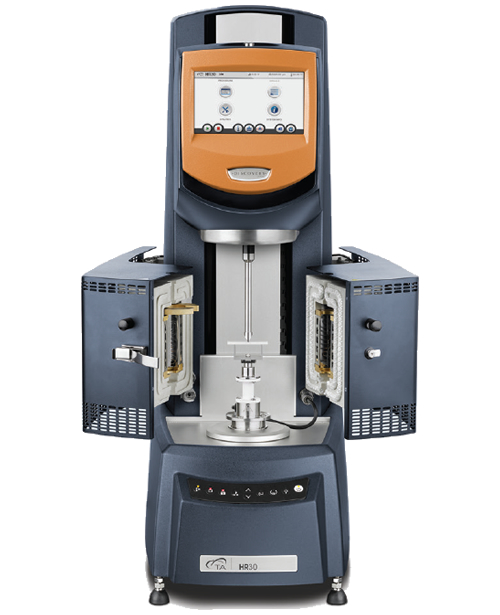
L’ARES-G2 est un rhéomètre rotatif haute performance de premier ordre qui fournit les données rhéologiques les plus précises dans une large gamme de conditions. Il est régulièrement utilisé dans des laboratoires de recherche de pointe pour relier la chimie des matériaux à leur aptitude au traitement et à leurs propriétés d’utilisation finale pour une grande variété de matériaux.
- Il s’agit du seul rhéomètre du marché doté de technologies de moteur et de transducteur dédiées, qui éliminent toute contribution inertielle et fournissent aux utilisateurs des données d’une précision inégalée.
- Reproduit les conditions de traitement et d’utilisation finale grâce à un contrôle précis et rapide de la température.
- À l’épreuve du temps grâce à des accessoires facilement interchangeables, y compris des mesures d’analyse mécanique dynamique entièrement intégrées (E’, E », E*) pour tester les matériaux solides.
Propriétés mesurées :
Viscosité, limite d’élasticité, thixotropie, durcissement, module (G’, G », G*), facteur d’amortissement (tan delta), transitions vitreuses, transitions sub-ambiantes, relaxation des contraintes, fluage-récupération
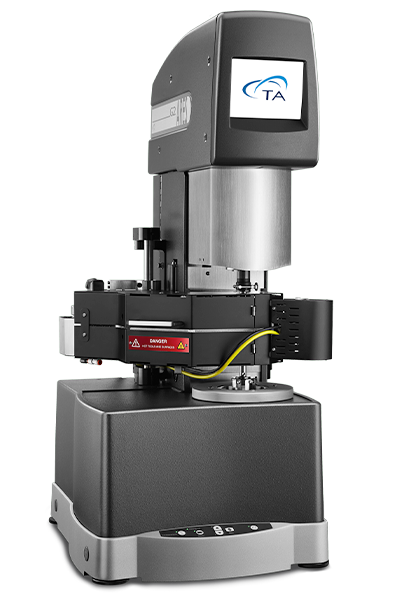
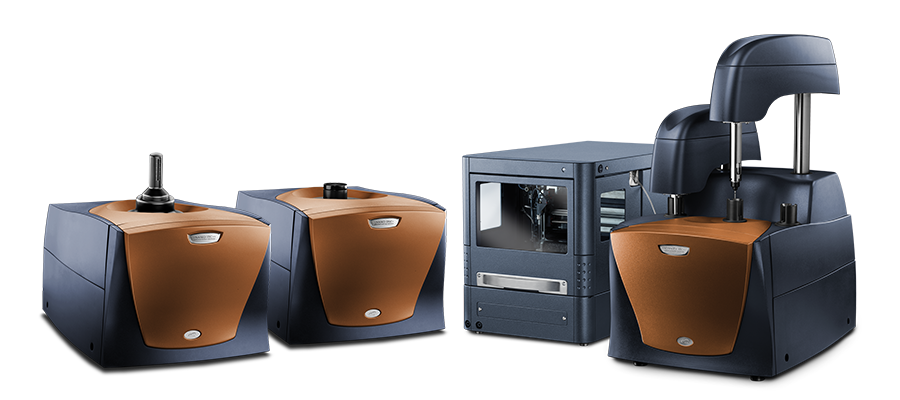
Instruments et applications de microcalorimétrie






Le nanocalorimètre différentiel à balayage est un calorimètre différentiel à balayage à haute sensibilité destiné à quantifier la stabilité thermique des échantillons liquides qui contiennent une biomolécule ou un échantillon biothérapeutique. Caractérisez facilement la stabilité structurelle en mesurant la chaleur de réaction causée par les événements de déploiement et de dénaturation.
- Effectuez des mesures reproductibles et sensibles sur des échantillons de petite taille (aussi petits que 2 microgrammes de protéines !), ce qui permet d’économiser du matériel précieux.
- Caractérisez les échantillons sans étiquette ni marqueur, ce qui simplifie l’installation et réduit les erreurs.
- L’échantillonneur automatique en option avec des plaques de 96 puits à température contrôlée et le chargement automatisé des échantillons permettent de réaliser des essais rigoureux sans surveillance.
- Des routines de nettoyage automatisées éliminent les effets de la contamination croisée de l’échantillon, ce qui garantit des mesures précises à chaque fois.
Propriétés mesurées : Stabilité thermique, stabilité structurelle, température de fusion, enthalpie, changement de capacité thermique, dénaturation, déploiement des protéines, fusion/réchauffement des acides nucléiques, stabilité de la capside, sérotype, stabilité des LNP, transition de phase, thermodynamique du dépliage
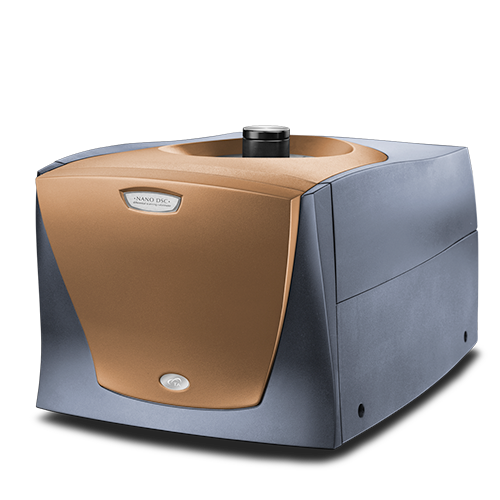
L’Affinity ITC est un outil rapide, précis et non destructif pour l’analyse des interactions biomoléculaires. Quantifiez facilement les détails structurels clés de la liaison moléculaire dans l’état natif de votre échantillon – il n’est pas nécessaire de le modifier avec des colorants, des étiquettes ou des marqueurs !
- Le positionnement intelligent du matériel garantit la fiabilité et réduit le risque de seringues cassées ou tordues, en particulier chez les utilisateurs inexpérimentés !
- La conception optimisée des cellules, combinée à une distribution précise des réactifs de titrage et à une technologie de mélange avancée, permet d’obtenir des données de la plus haute qualité.
- L’échantillonneur automatique HPLC en option avec stockage à température contrôlée de 96 puits d’échantillons garantit que l’échantillon est injecté de la même manière, à chaque fois.
- Des routines de nettoyage automatisées et programmables par l’utilisateur éliminent le risque de contamination croisée d’un cycle à l’autre.
Propriétés mesurées : Affinité de liaison, stœchiométrie (rapport de liaison), favorabilité et spécificité de la liaison, forces motrices thermodynamiques (enthalpie et entropie), relation structure-activité (SAR), cinétique enzymatique, concentration micellaire critique, dissociation des dimères.
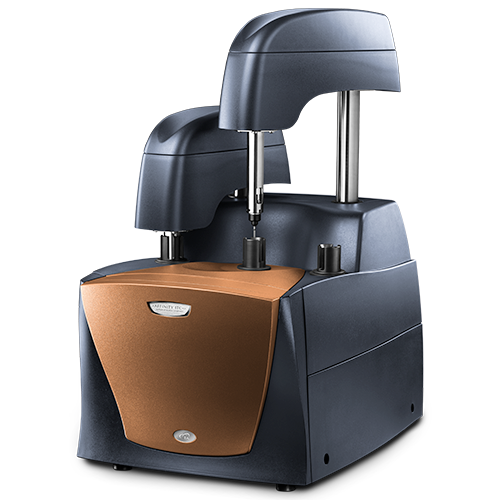
Le Nano ITC est conçu pour offrir une sensibilité et une flexibilité maximales pour l’analyse des événements de liaison dans les solutions organiques. Quantifiez l’affinité et la spécificité de la liaison, ainsi que le rapport de liaison (stœchiométrie) en une seule expérience !
- Disponible en volume standard (1 ml) ou en faible volume (190 µL) pour s’adapter à la taille de l’échantillon.
- La conception optimisée de la cellule maximise l’efficacité de l’agitation et élimine les « zones mortes » et les bulles d’air piégées, ce qui garantit les mesures les plus précises.
- La burette d’injection de haute précision et la seringue amovible délivrent le titrant avec précision et permettent un chargement rapide et fiable ainsi qu’un nettoyage complet.
Propriétés mesurées : Affinité de liaison, stœchiométrie (rapport de liaison), favorabilité et spécificité de la liaison, forces motrices thermodynamiques (enthalpie et entropie)
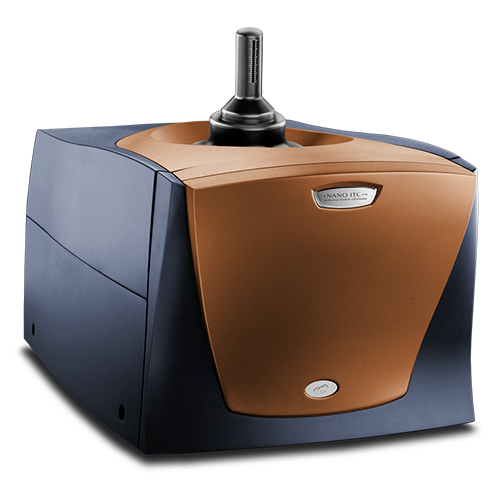
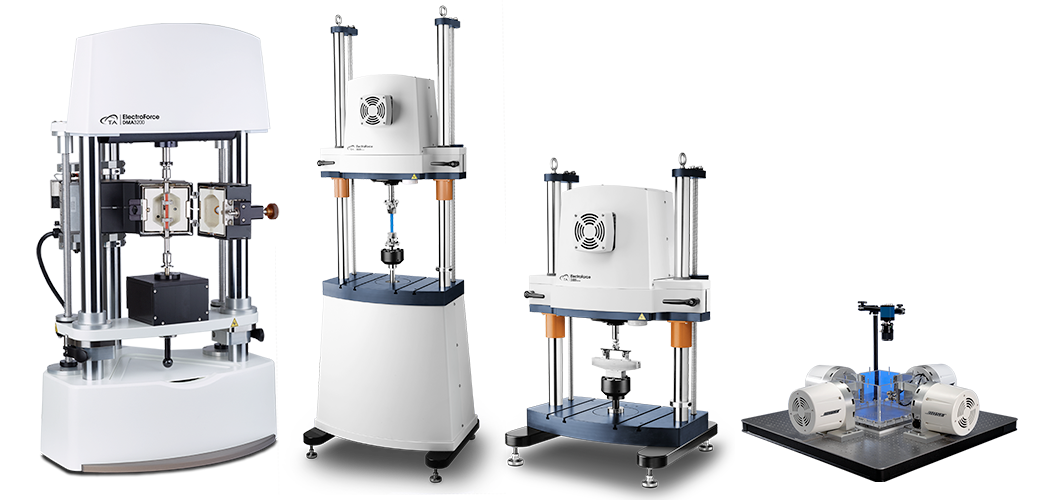
Instruments et applications d’essais mécaniques







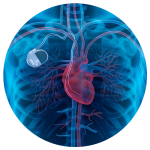

Le DMA 3200 est doté de la technologie brevetée du moteur linéaire ElectroForce, qui permet à un seul instrument d’offrir des performances et une précision de données inégalées. Cette technologie de moteur unique associe de puissants aimants en terres rares à une suspension flexible sans frottement pour un contrôle très précis de la force et du déplacement sur une large gamme de fréquences et d’amplitudes. Le moteur DMA 3200 délivre une force allant jusqu’à 500 N et des déplacements contrôlés allant de 1 micron à 13 mm. Les essais peuvent être réalisés en mode statique et dynamique.
Maximum Force: 500 N
Propriétés mesurées : Module complexe, E*, modules de stockage et de perte (E’ et E ») et amortissement (tan δ) des matériaux viscoélastiques, détection des mouvements moléculaires et développement de relations structure-propriété. Module de Young et paramètres de résistance des matériaux, y compris les courbes S-N pour la résistance à la fatigue.
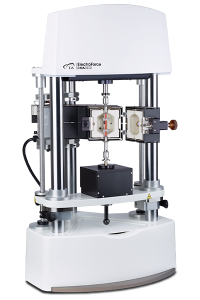
Les instruments d’essais ElectroForce® 3200 Series III ont une force maximale de 225 N (450 N en option). Grâce à la polyvalence de la réponse en fréquence de statique à 300 Hz, la configuration de table s’adapte à une variété d’applications de recherche biomédicale et d’essais de matériaux techniques, y compris les essais de torsion, le fluage sous charge dynamique et les environnements spéciaux (chambres chaudes/froides).
Force Range 3220: 0.002 N – 225 N
Force Range 3230: 0.002 N – 450 N
Propriétés mesurées : Module de Young et paramètres de résistance des matériaux, y compris les courbes S-N pour la résistance à la fatigue.
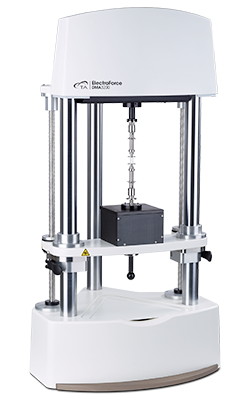
Les instruments ElectroForce 3300 série III sont bien adaptés à une variété d’essais qui incluent les normes ASTM et ISO pour la caractérisation des matériaux et des biomatériaux et les essais de durabilité à long terme des matériaux, des composants et des dispositifs.
La famille ElectroForce 3300 comprend deux modèles : l’ElectroForce 3310 offre une force maximale de 1 000 N et l’ElectroForce 3330 une force maximale de 3 000 N. Les deux modèles sont disponibles avec un châssis de table ou un châssis sur pied. Le châssis sur pied permet d’étendre les capacités en ajoutant des moteurs à torsion ou à course étendue. Toutes les configurations peuvent effectuer des essais allant d’un cycle par jour (ou des essais statiques) jusqu’à 100 Hz. Sélectionnez la capacité de force et la configuration du châssis qui conviennent à vos besoins d’essais.
Force Range 3330: 0.2 N – 3000 N
Force Range 3310: 0.02 N – 1000 N
Propriétés mesurées : Module de Young et paramètres de résistance des matériaux, y compris les courbes S-N pour la résistance à la fatigue.
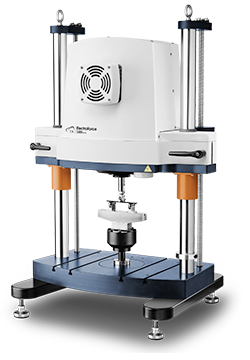
L’instrument de banc d’essai biaxial planaire ElectroForce offre un contrôle supérieur et des performances inégalées dans la caractérisation des matériaux et des tissus mous. Grâce à cet instrument, vous pouvez évaluer l’anisotropie mécanique et les relations contrainte-déformation dans des échantillons qui vont des dispositifs techniques, y compris les capteurs portables et les mailles de réparation des plaies, aux tissus tels que la peau, le péricarde et les feuillets des valves cardiaques. Cet instrument peut être configuré avec deux ou quatre moteurs linéaires ElectroForce montés sur une plaque de base horizontale et des options de cellule de charge pour chaque axe de chargement.
Force Range: 0.002 N – 200 N
Propriétés mesurées : Propriétés mécaniques telles que le module de Young, y compris les mesures d’anisotropie d’échantillons ou de tissus en forme de feuille.
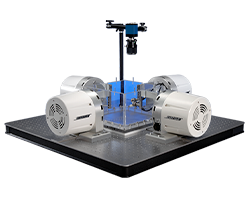








Le Discovery Laser Flash DLF 1200 est un instrument compact de paillasse pour la mesure de la diffusivité thermique, de la conductivité thermique et de la capacité thermique spécifique des matériaux à partir de la température ambiante jusqu’à 1 200 °C. Il est équipé d’une source laser brevetée de 17 joules d’énergie pour tester la plus large gamme d’échantillons dans les conditions les plus exigeantes. La productivité n’est pas un problème grâce à la conception du plateau à quatre échantillons. C’est le seul instrument de laser flash sur paillasse disponible avec une source d’impulsion laser pour une précision, une exactitude et des capacités supérieures à celles des sources lumineuses au xénon concurrentes.
Plage de température : Tamb à 1 200 °C
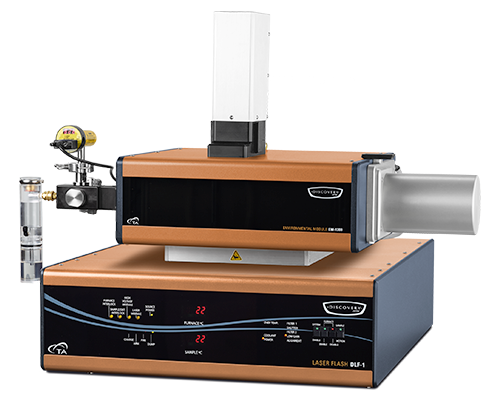
Programme de soutien académique
Assurez le bon fonctionnement de votre instrument et réduisez les temps d’arrêt, qu’ils soient dus à une utilisation routinière ou aux mains d’utilisateurs moins expérimentés (ou les deux). Notre programme de soutien académique est la garantie la moins chère et la plus complète disponible sur le marché. Il est conçu pour réduire le coût de possession, et maximiser la disponibilité et la durée de vie du produit.
Plus d’avantages :
- Inscription GRATUITE à nos cours de formation sur la théorie et les applications régulièrement programmés
- 10 % de réduction sur les fournitures et consommables

Contactez-nous pour commencer
*Les offres expirent le 12 décembre 2025. Certains modules, accessoires et produits d’équipementiers sont exclus. Les prix sur cette page sont indiqués en dollars américains. Les commandes internationales seront converties dans la devise locale avec le même taux de remise. Ces offres sont valides pour les ventes directes de TA Instruments en Amérique du Nord, en Europe et au Brésil. Veuillez contacter votre représentant local de TA Instruments pour des détails complémentaires.

